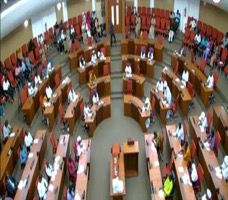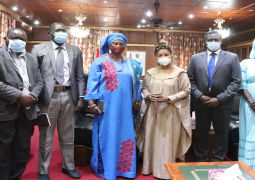
Tabling the motion, Saihu Jallow, the Member for Lower Baddibu Constituency, alluded that “too often, regulations exist on paper but enforcement is needed to make a real difference. He stated that “we must ensure that industries are held accountable for pollution, deforestation, and unsustainable practices. Strict and consistent enforcement; sends a clear message: protecting our environment is not optional,” he stressed.
“Every day, we witness the consequences of environmental negligence: extreme weather patterns, rising sea levels, loss of biodiversity, and the gradual degradation of our natural resources. These are no longer distant issues; they affect our communities, our livelihoods, and our health. This is a shared responsibility, but the government must lead the way.”
He added that “we need to prioritize renewable energy. The time has come to shift from fossil fuels to sustainable, renewable energy sources like solar, wind, and hydro. This transition will not only reduce our carbon footprint but will also create jobs, boost our economy, and position our nation as a leader in clean energy innovation. This is an investment in our future resilience.”
“We must invest in green infrastructure. Imagine cities with clean air, green spaces, and energy-efficient public buildings. By funding such projects, we can revitalize urban centers while also protecting natural resources. Green infrastructure means creating spaces that are both sustainable and resilient against climate-related challenges.”
He further urged for support to conservation efforts on environmental issues. “Protecting our forests, oceans, and wildlife areas is essential. These are not just resources to be exploited but are ecosystems that play a vital role in balancing our environment. Conservation zones, national parks, and marine reserves are sanctuaries that preserve our planet's biodiversity and natural heritage,” he said.
“Sustainable agriculture must be encouraged. Our farmers are the stewards of the land, and they deserve support to adopt sustainable practices. Reducing chemical pesticides, promoting crop rotation, and implementing soil conservation techniques will help protect both our food security and our ecosystems,” he added.
He noted that The Gambia has implemented several proactive measures to protect and preserve the environment, focusing particularly on combating plastic pollution, climate change, and enhancing resilience against environmental risks.
He also stated that the government recently launched a National Action Plan to End Plastic Pollution, “aiming to reduce plastic pollution by 86% over the next decade. This plan includes enhancing bans on single-use plastics, phasing out plastic bottles, and improving waste management through recycling and better collection systems. The plan also promotes sustainable alternatives, like public water stations, to decrease reliance on plastic bottles and water sachets.”
He called on the government to consider these and other steps to ease climate change in the country.




